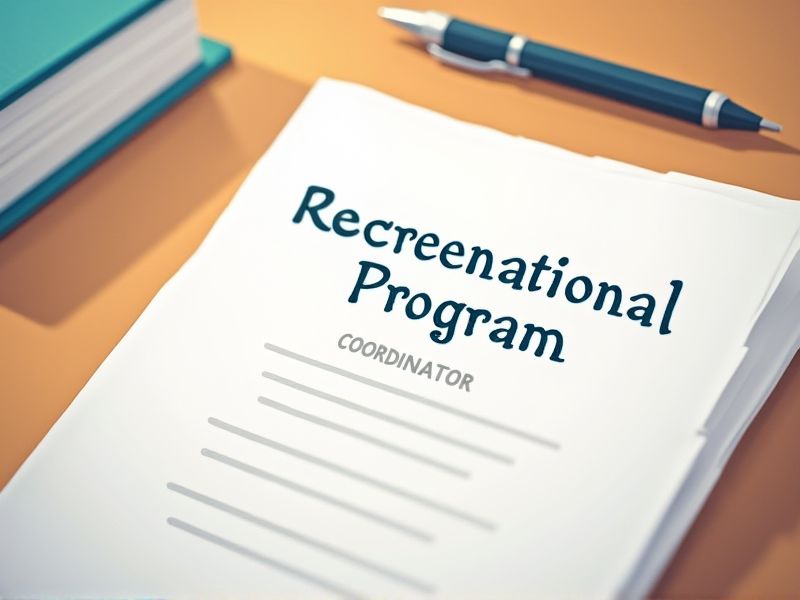
A Recreational Program Coordinator requires several certifications for efficient management and safety assurance in diverse recreational activities. Certifications such as first aid and CPR are crucial because they equip coordinators with life-saving skills in emergencies. Specializations in fitness, aquatic supervision, or outdoor leadership verify expertise and ensure adherence to industry standards. Key certifications for Recreational Program Coordinators are essential for informed and effective program management.
CPR/AED Certification
CPR/AED certification equips recreational program coordinators with essential lifesaving skills that can significantly improve survival rates during cardiac emergencies. Recreational activities often involve high physical exertion, increasing the risk of sudden cardiac arrest, making trained coordinators crucial for immediate response. Knowing CPR and AED use enhances overall participant safety, fostering trust and attracting more people to the programs. Certification ensures that coordinators are prepared to handle emergencies effectively, reducing potential liability issues for the organization.
First Aid Certification
First Aid Certification equips a Recreational Program Coordinator with the skills to effectively respond to emergencies, thereby enhancing participant safety. By understanding essential medical procedures, the coordinator can minimize the severity of injuries, reducing liability for the organization. Knowledge from certification can foster a culture of safety awareness among staff and participants, promoting a safer environment for activities. Holding a certification can elevate the program's credibility, potentially increasing participation and trust from the community.
Certified Park and Recreation Professional (CPRP)
A Certified Park and Recreation Professional (CPRP) credential ensures that a Recreational Program Coordinator possesses the necessary expertise to design and implement effective community programs, leading to increased participation and satisfaction. With a standardized benchmark of competencies, CPRP enhances program coordinator credibility, fostering community trust and engagement. Employment policies often prefer or require certified professionals, giving CPRP holders a competitive advantage in the job market. Continuing education associated with CPRP keeps coordinators updated on trends and best practices, ensuring relevant and innovative programming.
Lifeguard Certification
A Recreational Program Coordinator is responsible for overseeing a variety of water-related activities, and lifeguard certification ensures they possess essential safety skills. The certification provides knowledge in lifesaving techniques and emergency response, reducing the risk of accidents. Employment laws and insurance policies may also require certification to comply with safety regulations and liability coverage. Having certified skills enhances the coordinator's ability to train staff effectively and maintain a safer environment.
Youth Sports Coaching Certification
Youth sports coaching certification ensures that recreational program coordinators understand safe and effective training practices. It increases program credibility by demonstrating the coordinator's commitment to professional standards. A certification educates coordinators on developmental and age-appropriate coaching techniques. This qualification often leads to enhanced communication skills, benefitting both young athletes and their families.
Adaptive Recreation Certification
Adaptive Recreation Certification equips Recreational Program Coordinators with essential knowledge to design inclusive activities for individuals with disabilities, promoting equal participation. Adequate training through certification enhances the coordinator's ability to assess individual needs, ensuring safety and accessibility. Certification supports compliance with legal standards, reducing liability risks and fostering a positive community reputation. With specialized certification, coordinators can effectively train staff, improving program outcomes and participant satisfaction.
Group Fitness Instructor Certification
Obtaining a Group Fitness Instructor Certification equips a Recreational Program Coordinator with a comprehensive understanding of exercise science, which enhances the development of safe and effective fitness programs. The certification ensures that the coordinator possesses the necessary skills to engage various age groups and fitness levels, improving program inclusivity. It also builds credibility and trust among participants, which can lead to increased program enrollment and satisfaction. Furthermore, certified coordinators are better prepared to assess participant progress and make data-driven adjustments to programs, optimizing outcomes and resource allocation.
Event Planning Certification
Obtaining an event planning certification enhances a recreational program coordinator's ability to organize successful events, as it provides structured knowledge about logistics and resource management. Certified coordinators generally have improved skills in budgeting and risk assessment, which are crucial for managing various recreational programs. Certification often boosts credibility and trust with stakeholders, as it signals a recognized level of professionalism and expertise. Many certifications require staying updated with industry trends, ensuring coordinators are informed about new technologies and methodologies that can improve program effectiveness.
Emergency Response Training Certification
Recreational program coordinators oversee various activities where unexpected situations may arise, and they must be prepared to handle them swiftly and effectively. Emergency Response Training Certification equips coordinators with the skills to manage injuries or medical emergencies, ensuring participant safety. This certification also provides knowledge on evacuation procedures and crisis management, reducing potential liabilities for organizations. Employers often prefer certified professionals as it demonstrates a commitment to safety standards and enhances the trust of participants.
Child Development Associate (CDA) Credential
The Child Development Associate (CDA) Credential provides foundational knowledge in child growth and development, which aids Recreational Program Coordinators in designing age-appropriate activities. Having a CDA Credential equips coordinators with skills to assess children's needs effectively, enhancing program impact. The credential instills professional standards in interaction and care, ensuring safety and well-being in recreational settings. Many organizations prefer or require the credential as it signifies a commitment to quality and professionalism.
Summary
You can expect a more organized and effective program management when a Recreational Program Coordinator obtains certifications. Certifications can increase the coordinator's knowledge of best practices, leading to improved program quality and participant satisfaction. Budget management and risk assessment skills often enhance, potentially leading to reduced operational costs and safer environments. Additionally, the coordinator's professional credibility grows, increasing trust among stakeholders and participants.
